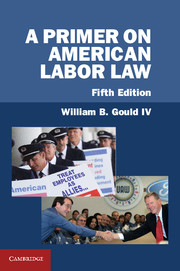Book contents
- Frontmatter
- Contents
- Preface to the Fifth Edition
- Preface to the Fourth Edition
- Preface to the Third Edition
- Preface to the Second Edition
- Preface to the First Edition
- 1 An Overview
- 2 Industrial Relations and Labor Law before Modern Legislation
- 3 The National Labor Relations Act and Related Labor Law
- 4 Unfair Labor Practices
- 5 Establishing the Collective Bargaining Relationship: Organization and Recognition
- 6 Economic Pressure and Bargaining Tactics in the Established Relationship
- 7 Remedies, the Labor Reform Bill of 1978, and the Employee Free Choice Bill of 2009
- 8 Dispute Resolution in the Established Relationship
- 9 The Duty of Fair Representation
- 10 The Public Sector
- 11 Public-Interest Labor Law
- 12 Conclusion
- Index
- References
10 - The Public Sector
Published online by Cambridge University Press: 05 June 2013
- Frontmatter
- Contents
- Preface to the Fifth Edition
- Preface to the Fourth Edition
- Preface to the Third Edition
- Preface to the Second Edition
- Preface to the First Edition
- 1 An Overview
- 2 Industrial Relations and Labor Law before Modern Legislation
- 3 The National Labor Relations Act and Related Labor Law
- 4 Unfair Labor Practices
- 5 Establishing the Collective Bargaining Relationship: Organization and Recognition
- 6 Economic Pressure and Bargaining Tactics in the Established Relationship
- 7 Remedies, the Labor Reform Bill of 1978, and the Employee Free Choice Bill of 2009
- 8 Dispute Resolution in the Established Relationship
- 9 The Duty of Fair Representation
- 10 The Public Sector
- 11 Public-Interest Labor Law
- 12 Conclusion
- Index
- References
Summary
The National Labor Relations Act excludes governmental or public employees from its coverage. In recent years state and local legislation on the subjects of collective bargaining and labor in the public sector has grown considerably. Forty-one of the states had some form of fairly comprehensive legislation protecting the right of public employees to organize and bargain collectively at the time of the fourth edition. (Some states provide that the public employer need only “meet and confer” with the union, but the practical result is often similar to that under the duty to bargain.)
On the eve of 2011, collective bargaining rights had been expanded for state university faculty and research assistants, and Illinois, New Jersey, Oregon, New Hampshire, California, and Massachusetts had all provided for card check recognition of the kind contained in the Employee Free Choice Act. In 2003 and 2004, New Mexico and Oklahoma expanded public-sector collective bargaining. But in 2011 much of this trend began to change. As of April 2011, a total of 744 antiunion bills had been introduced in state legislatures, encompassing “nearly every state.” The most prominent examples were Wisconsin and Ohio. Wisconsin, through its Budget Repair Bill, virtually eliminated collective bargaining for some public employees by (1) limiting wage increases to a particular percent change in the consumer price index; (2) instituting right-to-work legislation; (3) prohibiting automatic dues deductions; (4) providing a mandatory recertification system under which every union would face a recertification election every year and obtain recertification only if 51 percent of the employees in the unit (not just those voting) voted for recertification; and (5) limiting the duration of an agreement to one year. Ohio prohibited both the right to strike and the right to binding interest arbitration, legislation that was repudiated by Ohio voters at the ballot box in the fall of 2011.
- Type
- Chapter
- Information
- A Primer on American Labor Law , pp. 327 - 352Publisher: Cambridge University PressPrint publication year: 2013



